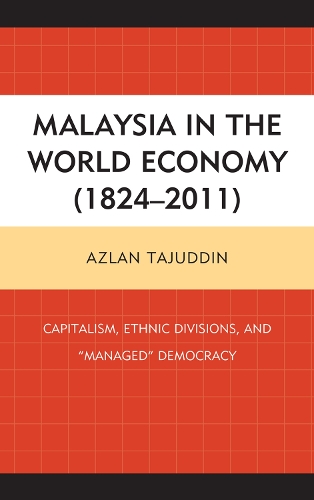
Malaysia in the World Economy (18242011): Capitalism, Ethnic Divisions, and "Managed" Democracy
(Hardback)
Available Formats
Publishing Details
Malaysia in the World Economy (18242011): Capitalism, Ethnic Divisions, and "Managed" Democracy
By (Author) Azlan Tajuddin
Bloomsbury Publishing PLC
Lexington Books
14th June 2012
United States
Classifications
Professional and Scholarly
Non Fiction
Ethnic studies / Ethnicity
Political economy
959.5
Physical Properties
Hardback
294
Width 160mm, Height 234mm, Spine 24mm
590g
Description
Does the industrial development of a country entail the democratization of its political system Malaysia in the World Economy examines this theme with regards to Malaysia in the period between 1824 and 2011. Capitalism was first introduced into Malaysia through colonialism specifically to supply Britain with much-needed raw materials for its industrial development. Aside from economic exploitation, colonial rule had also produced a highly unequal and socially distant multicultural society, whose multifaceted divisions kept the colonial rulers in supreme authority. After independence, Britain ensured that Malaysia became a staunch western ally by structuring in a capitalist system specifically helmed by western-educated elites through what appeared to be formal democratic institutions. In such a system, the Malaysian ruling elites have been able to manage the countrys democratic processes to its advantage as well as preempt or suppress serious internal challenges to its power, often in the name of national stability. As a result, an increasingly unpopular National Front political coalition has remained in power in the country since 1957. Meanwhile, Malaysias marginal position in the world economy, which has maintained its economic subordination to the developed countries of the west and Japan, has reproduced the internal social inequities inherited from colonial rule and channeled the largest returns of economic growths into the hands of the countrys foreign investors as well as local elites associated with the ruling machinery. Over the years however, the state has lost some of its political legitimacy in the face of widening social disparities, increased ethnic polarization, and prevalent corruption. This has been made possible by extensive exposures of these issues via new social media and communications technology. Hence, informational globalization may have begun to empower Malaysians in a new struggle for political reform, thereby reconfiguring the balance of power between the state and civil society. Unlike other past research, Malaysia in the World Economy combines both macro- and micro-theoretical approaches in critically analyzing the relationship between capitalist development and democratization in Malaysia within a comparative-historical and world-systemic context.
Reviews
This book provides a fascinating account of how Malaysias current political economic situation is best understood by taking a long-range view, one that looks to the countrys incorporation into the capitalist world system under colonial rule. ... There is much to recommend about this book. * Asian Studies Review *
Tajuddin's expert review of Malaysia's dependent state capitalist development and his optimistic expectation for greater democratization through the forces of civil society will inspire many who face similar challenges in other dependent lessdeveloped countries. -- Milton Esman, professor emeritus of government, Cornell University
This thought-provoking and original book can immensely benefit scholars, humanitarians, social justice activists, and journalists who are interested in a peripheral society of the Global South. It critically explores the connections among capitalist incorporation and development and the problems of ethno-national contradictions and elite democracy, and the imposition of limitations by the state on the liberties and the development of civil society in Malaysia. By combining historical and political-economic approaches, the book closely integrates idiographic and nomothetic modes of analysis to explain chains of factors that have jointly shaped the development of Malaysian society. This book also suggests ways of promoting social justice and a genuine multicultural democratic society in this country. -- Asafa Jalata, University of Tennessee-Knoxville
Azlan Tajuddin provides an world historical analysis that is both historically deep and timely of how social change in Malaysia reflects its position in the larger world-system and how Malaysians are struggling to make a better world for themselves and their neighbors. Tajuddins study challenges many of the shiboleths of both the neoliberal globalization project and economic nationalist policies. -- Christopher Chase-Dunn, Institute for Research on World-Systems, University of California, Riverside
Author Bio
Dr. Azlan Tajuddin is associate professor and chair of the Sociology Department at La Roche College in Pittsburgh, Pennsylvania. Dr. Tajuddin is trained as a political economist, and has presented and published several works in the area of ethnic relations, educational sociology, and even management.
